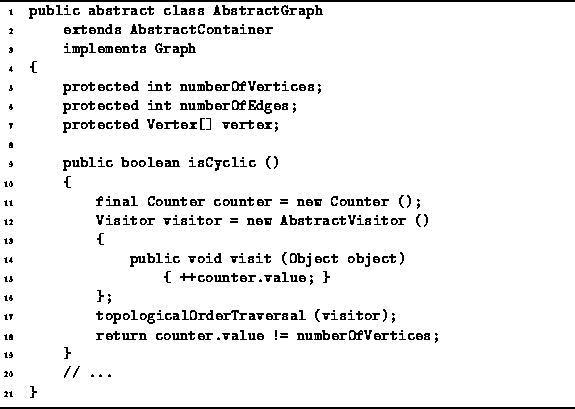The final application of graph traversal
that we consider in this section
is to test a directed graph for cycles.
An easy way to do this is to attempt a topological-order traversal
using the algorithm given in Section ![]() .
This algorithm only visits all the vertices of a directed graph
if that graph contains no cycles.
.
This algorithm only visits all the vertices of a directed graph
if that graph contains no cycles.
To see why this is so,
consider the directed cyclic graph ![]() shown in Figure
shown in Figure ![]() .
The topological traversal algorithm begins
by computing the in-degrees of the vertices.
(The number shown below each vertex in Figure
.
The topological traversal algorithm begins
by computing the in-degrees of the vertices.
(The number shown below each vertex in Figure ![]() is the in-degree of that vertex).
is the in-degree of that vertex).

Figure: A directed cyclic graph.
At each step of the traversal,
a vertex with in-degree of zero is visited.
After a vertex is visited,
the vertex and all the edges emanating from that vertex
are removed from the graph.
Notice that if we remove vertex a and edge (a,b) from ![]() ,
all the remaining vertices have in-degrees of one.
The presence of the cycle prevents
the topological-order traversal from completing.
,
all the remaining vertices have in-degrees of one.
The presence of the cycle prevents
the topological-order traversal from completing.
Therefore, the a simple way to test whether a directed graph is cyclic is to attempt a topological traversal of its vertices. If all the vertices are not visited, the graph must be cyclic.
Program ![]() gives the implementation of the isCyclic
method of the AbstractGraph class.
This boolean-valued accessor returns true if the graph is cyclic.
The implementation simply makes uses a visitor that counts
the number of vertices visited during a
topologicalOrderTraversal of the graph.
gives the implementation of the isCyclic
method of the AbstractGraph class.
This boolean-valued accessor returns true if the graph is cyclic.
The implementation simply makes uses a visitor that counts
the number of vertices visited during a
topologicalOrderTraversal of the graph.

Program: AbstractGraph class isCyclic method.
The worst-case running time of the isCyclic method
is determined by the time taken by the topologicalOrderTraversal.
Since ![]() ,
the running time of isCyclic is
,
the running time of isCyclic is
![]() when adjacency matrices are used to represent the graph
and
when adjacency matrices are used to represent the graph
and ![]() when adjacency lists are used.
when adjacency lists are used.